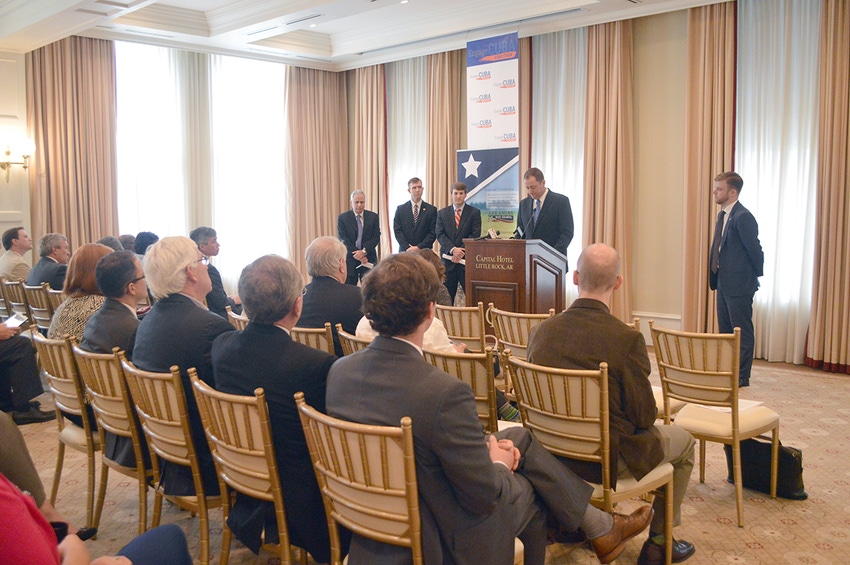
Arkansas leaders form new Engage Cuba state council to promote trade
“After 55 years, we have to ask ourselves if the Cuba embargo is performing its intended function, or if instead it is harming the Cuban people and states like Arkansas, which stands to benefit to the tune of a potential $1 billion export market,” said Rep. Rick Crawford.
April 12, 2016

The effort to restore Cuba as a major market for U.S. rice and other agricultural commodities took another step forward with the launch Monday (April 11) of the Arkansas State Council for Engage Cuba.
The launch was announced at a press conference co-sponsored by the USA Rice Federation in Little Rock. The event was attended by a large group of Arkansas agribusiness, community and academic leaders interested in boosting the state’s agricultural economy.
Arkansas is the nation’s largest rice-producing state, and Cuba once was a major buyer of rice from the United States. Although U.S. rice shipments resumed following passage of the U.S. Trade Sanction Reform and Export Enhancement Act in 2000, sales have never reached pre-embargo levels of the 1940s and 1950s.
“Under the leadership of Governor Asa Hutchinson, Senator John Boozman and Representative Rick Crawford, Arkansas is ground zero for our efforts to lift the travel ban and trade embargo,” said James Williams, president of Engage Cuba, speaking at the press conference.
“Arkansas is the living and breathing example of why we need to change this policy after 55 years of failure. The fact that Cubans are now eating rice from Vietnam instead of Arkansas is an outrage that needs to be changed.”
With more than 1.5 million acres of rice projected for Arkansas in 2016, removing barriers to trade with Cuba could have a huge impact. “The Arkansas Agriculture industry as a whole stands to benefit from increased trade opportunities with Cuba," said Arkansas Agriculture Secretary Wes Ward. "As the leading rice producing state, our rice industry would be the biggest benefactor.”
Dow Brantley, Arkansas rice farmer and chairman of the USA Rice Federation, acknowledged the Obama administration has taken steps to try to break down trade barriers between the U.S. and Cuba in recent months.
Ball in Congress’ court
“We applaud the positive steps made by the current Administration but feel we are at the point where further progress is dependent on our leaders in Congress,” said Brantley, who is a member of the new Arkansas State Council for Engage Cuba. “We ask our legislators to continue this momentum by normalizing trade with this nation.
USA Rice, Brantley added, “has been at the forefront of the push to lift the embargo since the 1990s, before there was the momentum we see today that we welcome and embrace. Restoring mutually beneficial, two-way commerce is at the heart of all of our industry’s efforts and the movement is making history almost daily.”
Besides Williams and Brantley, other speakers at the press conference were Juan Lamiguerio Leon, deputy chief of mission for the Cuban Embassy in Washington; Robert Moery, agriculture liaison for Governor Asa Hutchinson; and Secretary Ward.
“When it comes to U.S-Cuba relations, we have been running the same play over and over for the past few decades and nothing has changed,” said Sen. Boozman. “If we really want to bring about change, we need to try a new approach. Normalizing relations will allow us to remain competitive and create jobs at home, while pushing for change in Cuba.”
“After 55 years, we have to ask ourselves if the Cuba embargo is performing its intended function, or if instead it is harming the Cuban people and states like Arkansas, which stands to benefit to the tune of a potential $1 billion export market,” said Rep. Crawford, who returned from a trip to Cuba with Rep. Ralph Abraham of Louisiana on Saturday (April 9).
Crawford, Abraham tour Cuba
“After touring parts of the country, including Cuban agricultural markets, I believe that lifting the cash and carry requirement for agricultural exports remains the best way forward in normalizing trade relations with the island nation. For our policies to change in this Congress or the next, businesses and lawmakers must continue to build support for these incremental changes which yield positive results for Arkansas and the Cuban people.”
Arkansas’ top exports, including soybeans, rice and corn, are among the most in-demand products in Cuba, according to trade experts. Opening up Cuba for trade would allow Arkansas' agricultural industry and other businesses to reach more than 11 million new customers.
The Arkansas State Council includes 38 members from a cross section of Arkansas’ business, academic and political communities. Fourteen of those work directly with the Arkansas rice industry.
The Arkansas State Council is the fifth Engage Cuba state council, joining active councils in Minnesota, Ohio, Louisiana, and Tennessee. To learn more about the Engage Cuba state councils, visit www.engagecuba.org.
You May Also Like



